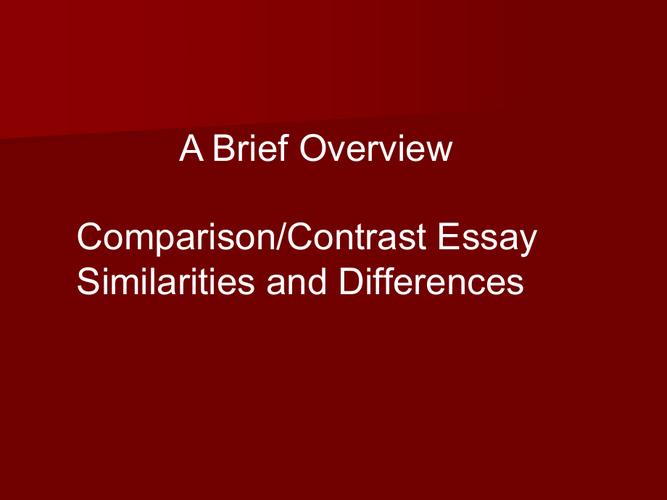compare contrast和compare的区别
大家好,今天给各位分享compare的一些知识,其中也会对contrast和compare的区别进行解释,文章篇幅可能偏长,如果能碰巧解决你现在面临的问题,别忘了关注本站,现在就马上开始吧!

本文目录
- compare的用法与区别
- compare和contrast的区别是什么
- compare短语搭配用法
- contrast和compare的区别
- compare用法总结精讲
- compare和compared的区别是什么
compare的用法与区别
一、用法
v.(动词)
1、compare的基本意思是“比较,对照”,主要用于比较事物的典型特征及其价值,而不在于比较相同与不同。
2、compare用作及物动词时接名词或代词作宾语,用作不及物动词时,主动形式常具有被动意义。
3、compare接with或to可表示“与…相比”,接to还可用于比喻,意为“比作”。接with还可表示“比得上”,这种用法常出现在疑问句或否定句中,且常与can连用。
二、区别
comparewith与compareto的区别:
1、comparewith的意思是“把……跟……比较”,一般用于两个同类事物之间,着重区别。
2、compareto的意思是“把……比作……看待”,一般用于两个不同性质的事物比较。
扩展资料:
词组辨析:
compare,compare to,compare with,contrast
这些动词(短语)均含“比较”之意。
1、compare侧重比较两个或更多东西的异同优劣,强调相同或类似之处。
2、compare to指两物有类似或相似之处,从而“把(一物)比作(另一物)。”
3、compare with指“把……用……作比较”以便找出差异或好坏。
4、contrast指比较两个或更多东西之间的差异,侧重不同点。
compare和contrast的区别是什么
compare和contrast的区别为:指代不同、语法不同、侧重点不同。
一、指代不同
1、compare:比较。
2、contrast:明显的差异。
二、语法不同
1、compare:compare的基本意思是“比较,对照”,主要用于比较事物的典型特征及其价值,而不在于比较相同与不同。
2、contrast:contrast的基本意思是把两个以上的事物摆在一起,以显示其不同之处。
三、侧重点不同
1、compare:compare意为“比较”,着重“相似之处”。
2、contrast:contrast指比较两个或更多东西之间的差异,侧重不同点。
compare短语搭配用法
compare短语搭配用法
compare with:表示把什么与什么相比,同类相比。
compare to:表示把什么比做什么,异类相比,比喻。
不同事物用Compare to,相同事物用Compare with。
with表示把什么和什么相比,比较,是指研究评判人与人之间,事物与事物之间相同或相异的程度。
例如:Compared with his past,he has changed a lot.
与过去相比,他变了很多。
to表示是指出两者之间的关系或相似。
例如:
We often compare a teacher to a candle.
我们常把老师比喻成蜡烛。
contrast和compare的区别
一、含义不同
compare
v.比较;;比喻。n.比较;对照
contrast
n.对比;差别;对照物。v.对比;成对照。n. [计算机]反差
二、用法不同
1、compare
compare的基本意思是“比较,对照”,主要用于比较事物的典型特征及其价值,而不在于比较相同与不同。
compare接with或to可表示“与…相比”,接to还可用于比喻,意为“比作”。接with还可表示“比得上”,这种用法常出现在疑问句或否定句中,且常与can连用。
He compared the two chairs before he decided which one to buy.
他比较了那两张椅子后,才决定买哪一张。
2、contrast
contrast的基本意思是把两个以上的事物摆在一起,以显示其不同之处。
contrast用作不及物动词时,接介词with,表示“与…形成对照”,主语一般是物。
contrast也可用作及物动词,常用于“contrast sth with sth”结构,意为“使…与…相对照”,主语一般为人,动词宾语与介词宾语表示相对照的物或事物。
Such a contrast between brother and sister is surprising.
兄妹之间如此之大的差别令人惊讶。
英语学习方法
1、英语基础
要想学好高三英语,英语基础是必须学好的,英语基础没有想象中的那么难,不管是单词还是句型、语法。
在高三复习的第一轮复习中,关于复习系会和语言点,一定要注意听,哪怕是一节课掌握几个短语也行,至于课后就自己拿起高中英语书,从单词背起,考英语一定要有词汇基础,否则什么都是白搭。
2、词典不离手
当在学习高三英语的时候,遇到不会的单词就要查,看到相近的单词分不清也得查明白,不要求自己一遍记住,就看一看给自己一个印象,大概一个单词你查五遍的时候就能记住了。
另外,一定要看英文解释!这个是避免完形填空选项中英语翻译发生歧义很有用的方法,希望能够帮助到大家。
3、英语语法
学习英语语法就像造房子,首先要把最基础的语法脉络理清,打好根基,之后就可以慢慢补充和拓展,让自己的英语知识点巩固起来。
compare用法总结精讲
compare是比较;对照;比喻为的意思,对于compare的用法你清楚吗,今天我在这里为大家介绍关于compare的英语知识,欢迎大家阅读!
compare用法总结精讲(1) compared to/with...和……相比
I’ve had some difficulties, but they were nothing compared to yours.
我遇到了一些困难,但与你的困难比起来就算不上什么了。
My own problems seem insignificant compared with other people’s.
与别人的问题相比,我自己的问题算不得什么。
(2) compare...to...把……比作
The poet compared the stream to the source of life.
诗人把溪水比作生命之泉。
(3) compare...with...把……和……比较
I compared the copy with the original, and there wasn’t much difference.
我比较了复印本与原件,不过差别不是很大。
(4) without/beyond compare无与伦比(compare用作名词)
The loveliness of the scene was beyond compare.
景色之美无与伦比。
compare用法相关知识(1) comparison n.比较;对比
(2) by comparison比较起来;相比之下
(3) by/ in comparison(with sb/sth)(与……)相比较
历届高考试题分析:
________ with the size of the whole earth, the biggest ocean does not seem big at all.(2004湖北卷)
A. Compare B. When comparing
C. Comparing D. When compared
【分析】该题考查状语从句的省略及动词compare的用法。compare可构成compare... with...短语,意为“把……与……相比较”,该句前面补全为When(it is) compared with the size of the whole earth,由于主句的主语和从句的主语一致,所以省略了it is,该题的正确答案为D。
compare的用法总结1. vt.比较;对照。着重人与人或事物与事物之间的异同,常和介词with连用。
If you compare both of our cars, you will find them very much alike.如果你对比我们的两辆汽车,你就会发现它们非常相似。
He began comparing himself with the other teammates and found he didn’t practice as hard as them.他开始将自己和其他的队员们比较,发现不如他们训练得认真。
2. vt.比喻为;比作。指出两个事物之间的关系或相似之处,常与介词to连用。
Young people are compared to the sun at eight or nine in the morning.年青人常常被比作早晨八、九点钟的太阳。
In many poems, we can see that poets compare sleep to death.在许多诗里面,我们会看到诗人把睡眠比作死亡。
3. vi.与……相比/匹敌。后接介词with。
No one can compare with Shakespeare as a writer of tragedies.作为悲剧作家,没有人能同莎士比亚相比。
My little house can’t compare with his villa.我的小房子是无法和他的别墅相比的。
4. n.比较。不可数,常用于惯用语中。
The view of the little hill is beyond compare.这小山的景色无与伦比。
The height of the new building is without compare in the world.这座新大楼的高度在世界上是无与伦比的。
compare相关词汇辨析compare,compare,compare,contrast
这些动词(短语)均含“比较”之意。
compare侧重比较两个或更多东西的异同优劣,强调相同或类似之处。
compare to指两物有类似或相似之处,从而“把(一物)比作(另一物)。”
compare with指“把……用……作比较”以便找出差异或好坏。
contrast指比较两个或更多东西之间的差异,侧重不同点。
compare的参考例句1. Compare this new TV set with the old one, you will see which is better.
将这台新电视机与旧电视机一比,你就会看出哪一台更好一些。
2. Compare with adults, the kids lack of experiences.
与成年人相比,孩子确实缺乏阅历。
3. You should compare the prices before you buy something.
你应该在买东西之前比较一下价格。
猜你喜欢:
1.介词to的用法归纳总结
2.英语介词to的用法总结
3. a和the的用法总结
4. agree的搭配用法总结
5. few和little的比较和区别
compare和compared的区别是什么
它们的区别是:compare with为主动语态,可以说compare A with B,把A和B作比较;compared with为被动语态,A is compared with B,A被拿来和B作比较.
一、compare with
读音:英 [kəmˈpeə(r) wɪð]美 [kəmˈper wɪð]
释义:与…相比;比得上,可与…相比
例句:Ican'tcomparewithhim.我不如他。
语法:当compare被用作不及物动词时,由于在估计相似之处,英式英语中常常使用with。
例句:His achievements do not compare with those of A. J. Ayer.他的成就无法跟A.J.耶尔的成就相比。
二、compared with
读音:英 [kəmˈpeəd wɪð]美 [kəmˈperd wɪð]
释义:和…比起来
例句:He'sapygmywhencomparedwithgreatmusicians.他和伟大的音乐家相比就成了侏儒。
语法:
你得看逻辑关系,看是主动还是被动,不过比较一向是被动的,所以compared with就比较常用.
Compared with others' houses, ours is small and old.和别人的房子相比,我们的房子又小又旧。
你看这句,ours是主语,是“被”比较,跟什么比较呢?跟others' houses比较.
Comparing others' houses, I find ours is small and old.相比于别人的房子,我发现我们的房子又小又旧。
主语是I,所以Compare是I发出的动作,但不是谓语哦,谓语是find.例如:He left, leaving the door open.
扩展资料compare的用法、句型与搭配:
一、表示“把……与……比较”,通常用compare…with…,但在现代英语中,也可用compare… to…,或者用compare…and…。
例句:
1.If you compare his work with [and] hers, you’ll find hers is much better.要是把他俩的工作比较一下,就会发现她的好得多。
2.Having compared the new dictionary with [to, and] the old one, he found the new one more helpful.将新旧词典比较之后,他发现新词典更有用。
二、表示“把……比作……”,通常用compare…to…,一般不用compare…with…
例句:
1.Shakespeare compared the world to a stage.莎士比亚把世界比作舞台。
2.The poet compares the woman he loves to a rose.诗人把他所爱的女人比作玫瑰。
三、在compared to [with](与……相比)这一习语中,用to或with已没什么区别。
例句:
1.Compared with [to] him, I’m just a beginner.和他相比,我只是一个初学者。
2.Compared to [with] many women, she was very fortunate.和许多女人相比,她算是很幸运的了。
四、用作不及物动词时,其后习惯上只接with,多与情态动词can连用,表示“比得上”“能与……比美”,但一般用于否定句或疑问句中。
例句:Nothing can compare with wool for warmth.没有比羊毛更暖和的东西了。
好了,文章到此结束,希望可以帮助到大家。
与本文知识相关的文章:



